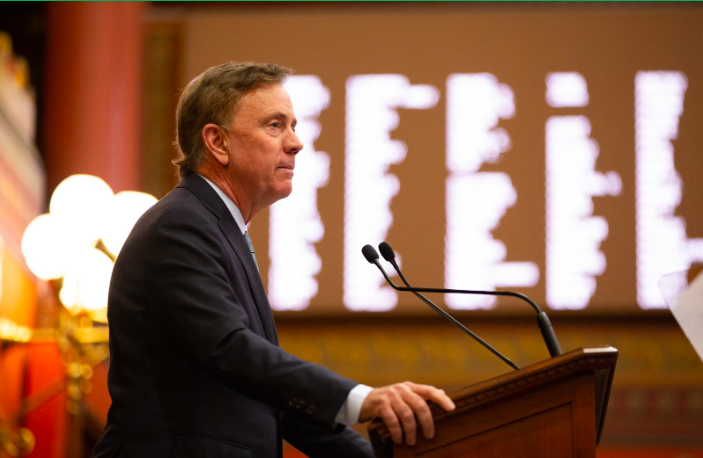Governor Lamont proposes school redistricting bill
Governor Ned Lamont (pictured) discussing and easing concerns about his school redistricting proposal in a meeting with the First Selectmen throughout Connecticut.
Governor Ned Lamont proposed a public school regionalization plan as a way of closing Connecticut’s growing $3.7 billion deficit. Lamont announced the plan during his State Budget proposal to a joint session on the state legislature on Feb. 20.
The bill seeks to save money through consolidation of school districts with fewer than 2,000 students. It also hopes to eliminate redundant expenditures including multiple superintendent salaries, back-office services such as information technology and other functions that could be performed by a smaller workforce when several smaller school districts are combined.
The bill would offer bonuses to towns willing to combine services. However, it also intends to reduce education aid for smaller towns that opt out of the plan starting in mid-2020.
“Small local school districts that choose to have inefficient governance structures and too many expensive superintendents can no longer expect the state to bear the costs of these decisions,” Lamont’s budget document says. “Under this budget, a small local district’s decision to retain rather than share a superintendent may result in a reduction of a district’s [Education Cost Sharing] grant, after July 1, 2020.”
In a meeting with the First Selectmen throughout Connecticut, Lamont sought to ease concerns by explaining the bill as a reward rather than a punishment. Lamont stresses the importance of being cautious about such a sensitive matter,
“We must lead with the carrot and not force peoples’ hands,” Lamont said.
According to the CTpost, after the meeting, State Senator Will Haskell said he favors incentivizing small district efficiency but opposes anything that would force districts to merge.
There will be a public hearing set for March 1 before The State Legislatures Education Committee.
Lamont’s proposal has already begun to stir controversy and tension with districts and residents strongly opposed to the potential of redistricting.
An opposition rally, known as “Hands off our Schools,” drew upwards of 200 protestors in Ridgefield on Feb 24. Attendees took to Main Street with posters and chants in protest of the proposed change.
“These bills being discussed will negatively impact our educational quality,” protest organizer Liz Floegel said. “They will be difficult to manage, and not one of these bills has any metric of school quality improvement in it.”

















































